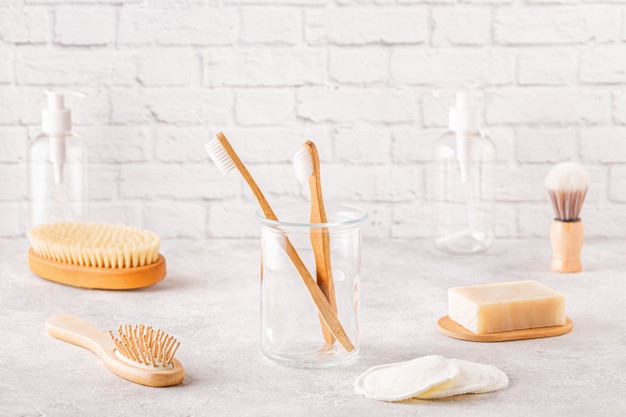
International Plastic-Free July means that the whole world’s gets the opportunity to reassess, manage and adjust our attitudes and behaviours when it comes to plastic use. In commemoration of International Plastic-Free July, we at Conscious Lifestyle Collective launched the 30 day plastic-free challenge with the aim of educating and providing you with an opportunity to look into the ways you can be more plastic-free. The challenge is divided into four focus areas covering bathroom, kitchen, shopping and eating out.
In this instalment of plastic-free month, we are providing you with all you need to know about how to get your bathroom to be more plastic-free!
Body Washing
Problem
- Many of us use different products for different purposes (i.e. shampoo and conditioner for hair, body wash for our bodies, hand wash liquid for our hands, etc). A lot of the time, these products are packaged in plastic containers that we throw away without recycling.
Solution
- You will be glad to know that all your bodily washing needs can be met by a singular bar of soap! If you would like to go a step further, click here to learn how to make your own body soap using home ingredients.
- If you are uncomfortable with the idea of using a single bar of soap for all your bod hygiene needs, be sure to visit plastic-red grocers such as the The Refillery where you can buy or refill your glass containers.
- If you intend on disposing of your plastic containers, please ensure that the plastic type is recyclable and that you recycle the material correctly. Click here to view a guide on which plastics are recyclable in South Africa.
Benefit
- A single bar of soap is the best option, because it lasts longer, saves you money in the long run and reduces your amount of plastic waste.
- Going the refilling route is also beneficial as it also saves you money, helps reduce waste, while supporting local business.
Cream/Skin Moisturiser
Problem
- Many of us often buy creams that come in plastic packaging and in small quantities. This means we are creating unnecessary waste while spending more money in shorter periods of time.
Solution
- You can shop at plastic-free grocer such as The Refillery where you can get your creams refilled.
- If you are a DIY person, you can make your own creams using home ingredients. Click here to watch a video on how you can make your own cream in the comfort of your own home!
Benefit
- Shopping at plastic-free retail facilities reduces your personal waste and saves you more money in the long run.
- Learning how to make your own cream means making use of the resources that are already in your home to make something more useful. This means you spend less money and less time on cream products, while reducing your plastic usage and waste. Making your own cream is also a productive way to spend your time.
Dental Care
Problem
- Did you know that plastic toothbrushes cannot be recycled? As a result, an estimated that 240 million plastic toothbrushes are discarded in South Africa every year according to Simply Bamboo. Dental floss is also a major contributor to the pollution of South Africa’s urban, non-urban and aquatic environments.
- Much of the popular dental care solutions (toothpaste, mouth wash, dental floss, etc) currently on the market are packaged in plastic that is often discarded incorrectly and ends up in landfills that pollute our land and water ecosystems.
Solution
- Swop your plastic toothbrush with a bamboo toothbrush.
- Swop your plastic-packaged dental care solutions with products such as toothpaste tablets; and, mouth wash you can refill and store in glass or aluminium jars or bottles. Dental floss in a glass tube made from bioplastic.
Benefit
- Swop your plastic toothbrush with a bamboo toothbrush.
- Swop your plastic-packaged dental care solutions with products such as toothpaste tablets; and, mouth wash you can refill and store in glass or aluminium jars or bottles. Dental floss in a glass tube made from bioplastic.
Earbuds
Problem
- Many of us use plastic earbuds, because they are cheap and easily accessible. The problem with plastic earbuds lies in how we dispose of them. Many of us wrap our plastic earbuds in toilet paper and throw them in the bin, or worse, dispose them into the toilet. These earbuds end up polluting our land and aquatic systems, affecting life that depend on these ecosystems.
Solution
- Bamboo and paper earbuds are better options than plastic earbuds as far as being eco-friendly is concerned. This is because they are both recyclable and biodegradable.
- Another solution is to learn how to make you own earbuds from cotton. After replacing the ends, you can can removed the used ends and depose them in your compost bin. Click here to watch a video on how to make DIY earbuds.
Benefit:
- The main benefit, especially if you go the DIY earbuds route, is that you save money, while maximising your timing learning how to make something that lasts longer. You also contribute to your garden by making compost from used earbuds in the process.
Sanitary Pads and Menstrual Cups
Problem
- Sanitary pads and menstrual cups have been at the centre of public outcry for reform in South Africa for a long time. Reform of the sanitary pad product has to happen on economic, social and ecological levels.
- Pads are are often very expensive, and therefore, inaccessible to those that need them the most.
- Pads are rarely sold in bulk. This means that people spend more money in shorter periods of time purchasing and using pads.
- Pads are packaged in single-use plastic, which is difficult to recycle.
- Pads themselves are not recyclable and are often disposed into the bin, or worse, the toilet. Both methods of disposal cause are problematic as they cause clogging of our sanitation systems and overall pollution the environment.
Solution
- Reusable pads and menstrual are the perfect solution. If you would like to know more about these items click here watch a short video about them. You can also click here to watch an interview between Conscious Lifestyle Collective and founder of reusable menstrual product brand MoonTime.
Benefit
- Buy opting for reusable pads, you save money and many trips to the shops buying pads.
- Because of their eco-friendly nature, reusable pads often come in plastic-free packaging. This means that by using reusable pads, you are reducing your plastic waste.
- Reusable pads are also beneficial for the environment as there is no need to dispose of the pad immediately after using it. By using reusable sanitary pads, you are decreasing the effect of the ecological dangers associated with traditional pads.

